Difference between revisions of "Shrunken head"
| Line 10: | Line 10: | ||
</p> | </p> | ||
<p align=center> | <p align=center> | ||
| − | ''Shrunken heads from about 1940 | + | ''Shrunken heads from about 1940 from Ecuador.''<br></p> |
<p> </p> | <p> </p> | ||
| − | Shrinking heads | + | Shrinking heads was traditionally part of the culture of indigenous peoples and ethnic groups of [https://www.youtube.com/watch?v=LDmkdFwqTt8&list=PLdGEmp0I4Bawry89Il_c1uc1F7M0Tr7sx South America], especially the Aguaruna and Shuar in Ecuador and [https://www.youtube.com/watch?v=ODBvozVseQc&list=PLdGEmp0I4BayBAuHDd6GT_hqk-EB3JXcZ Peru]. After armed conflicts between warring tribes, the victors used to cut off their dead opponents' heads. |
| − | As soon as possible, the skull bones were removed and the mouth and the eye holes were sewn from the inside. Then the skin was filled with sand and heated in hot water (not boiling, so that the hair | + | As soon as possible, the skull bones were removed and the mouth and the eye holes were sewn from the inside. Then the skin was filled with sand and heated in hot water (not boiling, so that the hair did not dissolve) and pre-shrunk. Further shrinkage to the desired size took place with stones and hot sand, which were swivelled inside the shrunk head. The darkness of the skin was presumably caused by smoke. |
| − | The religious-magical | + | The religious-magical idea behind shrunk-head manufacturing was that the physical and mental energies of the vanquished would pass over to the owner of the head. Anyone who could show a large collection of shrunken heads was therefore a dreaded magician and warrior. |
| Line 28: | Line 28: | ||
<p> </p> | <p> </p> | ||
| − | + | Shrunken heads have often been falsified and made from animal skin. Sometimes to deceive people, but sometimes also as a leather accessory. | |
| Line 36: | Line 36: | ||
</p> | </p> | ||
<p align=center> | <p align=center> | ||
| − | ''Imitation | + | ''Imitation shrunk head at the horror films festival in [https://www.youtube.com/watch?v=oDlGwy3pz0c Sitges] near [https://www.youtube.com/watch?v=oEc6xLTS4aY Barcelona].''<br></p> |
<p> </p> | <p> </p> | ||
| Line 42: | Line 42: | ||
==[[Leather videos|Videos]] about shrinking leather== | ==[[Leather videos|Videos]] about shrinking leather== | ||
<p align=center> | <p align=center> | ||
| − | <flashow> | + | <flashow>//www.youtube.com/v/lp43hlYeqVg&fs=1&color1=0x660000&color2=0x550000&border=1|width=500|height=281,25</flashow> |
</p> | </p> | ||
<p align=center> | <p align=center> | ||
| Line 50: | Line 50: | ||
==Scalps - Scalping== | ==Scalps - Scalping== | ||
| − | Scalping is the removal of the scalp (scalp with hair) | + | Scalping is the removal of the human scalp (scalp with hair). This method is best known from the Indians of North America. The scalps of the killed enemies were collected as trophies. Scalping has also existed in other cultures. The scalp was not tanned but [[parchment|dried]]. |
| Line 65: | Line 65: | ||
* A count of Erbach in Hesse (Germany) is said to have made himself trousers from the skin of an underling. | * A count of Erbach in Hesse (Germany) is said to have made himself trousers from the skin of an underling. | ||
| − | * In the Bavarian (Germany) army museum is supposed to be a drum, which is covered with human skin. | + | * In the Bavarian (Germany) army museum there is supposed to be a drum, which is covered with human skin. |
* In the collection of the library of the University of Harvard a book has been found, which has been covered with human skin. The title: "Des destinées de l'âme" by the French writer Arsène Houssaye from the 19th century. | * In the collection of the library of the University of Harvard a book has been found, which has been covered with human skin. The title: "Des destinées de l'âme" by the French writer Arsène Houssaye from the 19th century. | ||
| Line 77: | Line 77: | ||
<p> </p> | <p> </p> | ||
| − | * * It was reported that in the time of Hitler the skin of concentration camp prisoners was processed | + | * * It was reported that in the time of Hitler the skin of concentration camp prisoners was processed into [[parchment]] for lampshades. Objects were not found, but testimonies say that the camp commandant of Buchenwald had a lampshade made with the skin of victims and that the frame of the lamp partly consisted of human bones. A serial production, however, probably did not exist. |
| − | * The film "The Silence of the Lambs" is about a serial killer who kills young women to sew a dress from their skin to | + | * The film "The Silence of the Lambs" is about a serial killer who kills young women to sew a dress from their skin to transform e him into a woman. |
Revision as of 07:21, 27 April 2017
Contents
Shrunken heads
Shrunken heads from about 1940 from Ecuador.
Shrinking heads was traditionally part of the culture of indigenous peoples and ethnic groups of South America, especially the Aguaruna and Shuar in Ecuador and Peru. After armed conflicts between warring tribes, the victors used to cut off their dead opponents' heads.
As soon as possible, the skull bones were removed and the mouth and the eye holes were sewn from the inside. Then the skin was filled with sand and heated in hot water (not boiling, so that the hair did not dissolve) and pre-shrunk. Further shrinkage to the desired size took place with stones and hot sand, which were swivelled inside the shrunk head. The darkness of the skin was presumably caused by smoke.
The religious-magical idea behind shrunk-head manufacturing was that the physical and mental energies of the vanquished would pass over to the owner of the head. Anyone who could show a large collection of shrunken heads was therefore a dreaded magician and warrior.
Repair with Liquid Leather.
Shrunken heads have often been falsified and made from animal skin. Sometimes to deceive people, but sometimes also as a leather accessory.
Imitation shrunk head at the horror films festival in Sitges near Barcelona.
Videos about shrinking leather
Film about the shrinking of leather
Scalps - Scalping
Scalping is the removal of the human scalp (scalp with hair). This method is best known from the Indians of North America. The scalps of the killed enemies were collected as trophies. Scalping has also existed in other cultures. The scalp was not tanned but dried.
Scalp and scalpel knife of the Indians of North America.
Leather from human skin - human leather
- An unusual case occurred in England in the first half of the nineteenth century. After the execution of a murderer his skin was used to cover the process files.
- A count of Erbach in Hesse (Germany) is said to have made himself trousers from the skin of an underling.
- In the Bavarian (Germany) army museum there is supposed to be a drum, which is covered with human skin.
- In the collection of the library of the University of Harvard a book has been found, which has been covered with human skin. The title: "Des destinées de l'âme" by the French writer Arsène Houssaye from the 19th century.
Leather book covers made of human skin.
- * It was reported that in the time of Hitler the skin of concentration camp prisoners was processed into parchment for lampshades. Objects were not found, but testimonies say that the camp commandant of Buchenwald had a lampshade made with the skin of victims and that the frame of the lamp partly consisted of human bones. A serial production, however, probably did not exist.
- The film "The Silence of the Lambs" is about a serial killer who kills young women to sew a dress from their skin to transform e him into a woman.
Additional information







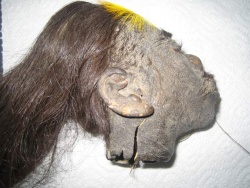
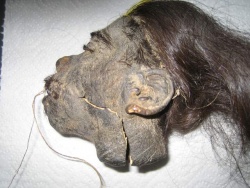
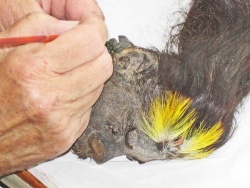
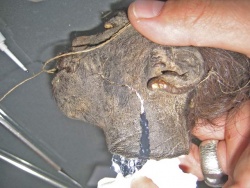
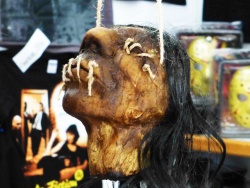
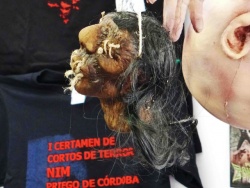
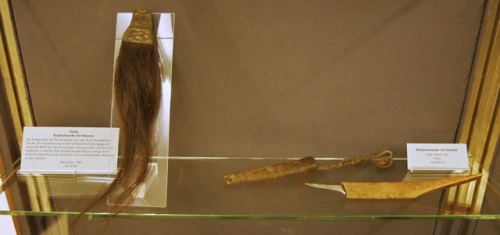


 a kotori web solution
a kotori web solution